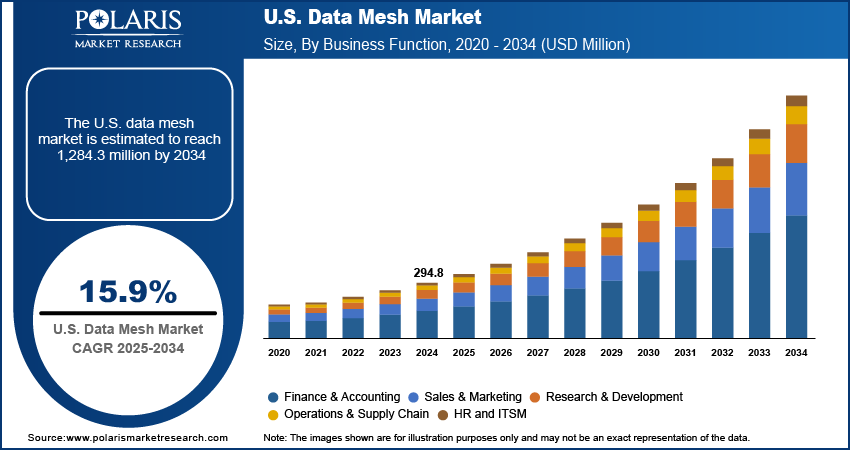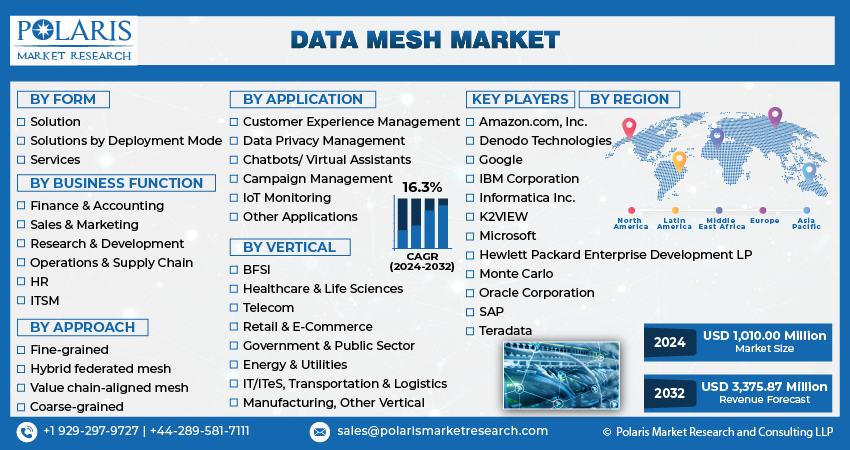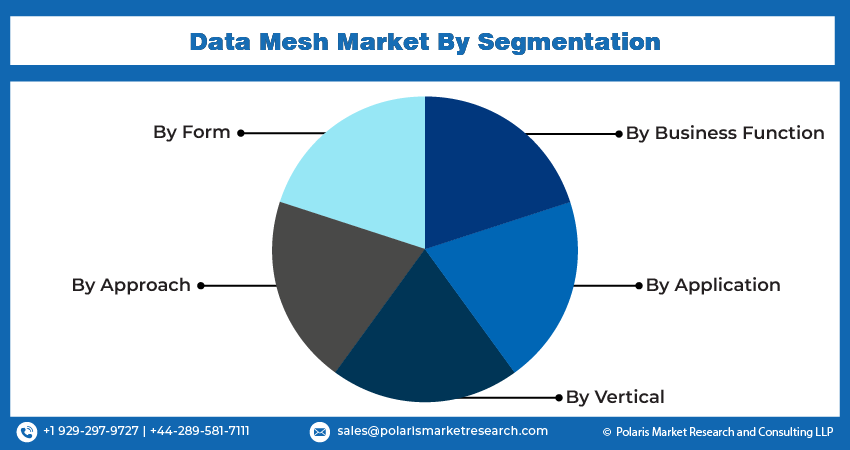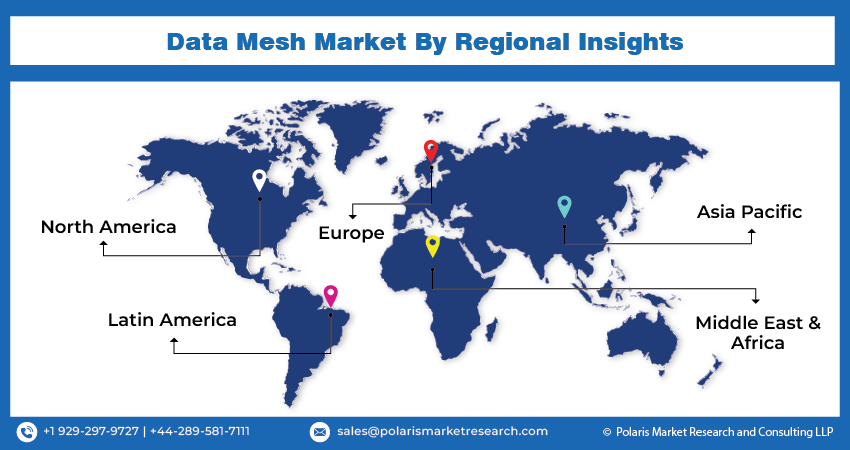
Data Mesh Market Share, Size, Trends, Industry Analysis Report, By Business Function (Finance & Accounting, Sales & Marketing, Research & Development, Operations & Supply Chain, HR and ITSM); By Approach; By Application; By Vertical; By Form; By Region; Segment Forecast, 2024 - 2032
- Published Date:Jun-2024
- Pages: 114
- Format: PDF
- Report ID: PM4393
- Base Year: 2023
- Historical Data: 2019-2022
Report Outlook
Data mesh market size was valued at USD 868.59 million in 2023. The market is anticipated to grow from USD 1,010.00 million in 2024 to USD 3,375.87 million by 2032, exhibiting the CAGR of 16.3% during the forecast period.
Industry Trends
The growing digital transformation across industries is a significant driver of the Data Mesh market, as organizations seek more efficient, scalable, and agile data management solutions to support their digital initiatives. As businesses undergo digital transformation journeys to modernize their operations, enhance customer experiences, and drive innovation, they are generating vast amounts of data from diverse sources such as IoT devices, social media platforms, and enterprise applications.

To Understand More About this Research:Request a Free Sample Report
Data Mesh addresses the challenges posed by digital transformation by providing a decentralized data management approach that enables organizations to effectively harness the power of their data. By decentralizing data ownership and analytics capabilities, Data Mesh allows domain-specific teams to access and analyze data relevant to their areas of expertise, facilitating faster insights and more informed decision-making. Furthermore, as digital transformation initiatives drive the adoption of cloud computing and other technologies, Data Mesh solutions provide scalability, flexibility, and compatibility with modern IT infrastructures. This enables organizations to seamlessly integrate Data Mesh frameworks into their digital ecosystems, supporting their digital transformation goals while ensuring efficient and effective data management practices.
Overall, the growing digital transformation landscape is driving the demand for Data Mesh solutions as organizations recognize the need for more agile, scalable, and collaborative approaches to data management in an increasingly digital world.
Key Takeaways
- North America dominated the market and contributed over 33% share of the data mesh market in 2023
- By business function category, sales & marketing segment dominated the global data mesh market size in 2023
- By application category, the IoT monitoring system segment is projected to grow with a significant CAGR over the data mesh market forecast period
What are the market drivers driving the demand for market?
Growing Data Complexity Driving the Data Mesh Demand
The growing adoption of Data Mesh is driving the Data Mesh market due to its transformative impact on data management practices. As organizations grapple with the increasing volume, variety, and velocity of data generated from diverse sources, traditional centralized data architectures struggle to scale and accommodate the complexity of modern data ecosystems. Data Mesh addresses these challenges by decentralizing data management, empowering domain-specific teams to take ownership of data and analytics within their respective areas.
This shift towards decentralized data management is driven by the need for greater agility, scalability, and innovation in data-driven decision-making. By democratizing access to data and analytics capabilities, Data Mesh enables organizations to respond more quickly to changing business needs, derive deeper insights, and drive innovation across the organization. Additionally, Data Mesh promotes cross-functional collaboration, breaking down silos and fostering a culture of data-driven decision-making.
Which factor is restraining the demand for the market?
Data Privacy and Security Concerns
Data Privacy and Security Concerns pose significant challenges to the Data Mesh Market, as decentralized data management introduces complexities and risks that need to be addressed effectively. One of the primary concerns is ensuring compliance with data protection regulations such as GDPR, CCPA, and HIPAA. Decentralized data management requires robust governance mechanisms to ensure that data is handled securely, accessed only by authorized users, and used in accordance with regulatory requirements. Failure to comply with these regulations can result in severe penalties and damage to reputation. Moreover, decentralized data management increases the surface area for potential security breaches, as data is distributed across multiple domains, systems, and teams. Ensuring data security requires implementing robust encryption, access controls, and authentication mechanisms to protect data at rest and in transit.

Report Segmentation
The market is primarily segmented based on business function, approach, application, vertical, form, and region.
|
By Business Function |
By Approach |
By Application |
By Vertical |
By Form |
By Region |
|
|
|
|
|
|
To Understand the Scope of this Report:Speak to Analyst
Category Wise Insights
By Business Function Insights
Based on business function category analysis, the market has been segmented on the basis of finance & accounting, sales & marketing, research & development, operations & supply chain, and HR and ITSM. Sales & Marketing captured the largest market share in the Data Mesh Market due to its critical role in driving revenue growth and customer engagement. By leveraging Data Mesh frameworks, organizations can integrate and analyze diverse data sources to gain comprehensive insights into customer behavior, preferences, and market trends. This enables more targeted marketing campaigns, personalized customer experiences, and optimized sales strategies, ultimately driving higher conversion rates, customer satisfaction, and market share within the Sales & Marketing domain.
In the market, the sales & marketing business function emerges as a pivotal player in leveraging data-driven insights to optimize customer engagement and drive revenue growth. By embracing Data Mesh frameworks, Sales & Marketing teams gain access to a wealth of diverse, decentralized data sources, facilitating a deeper understanding of customer behavior, preferences, and market trends.
By Application Insights
Based on application category analysis, the market has been segmented on the basis of customer experience management, data privacy management, chatbots/ virtual assistants, campaign management, IoT monitoring, and other applications. IoT monitoring are experiencing the highest compound annual growth rate (CAGR) in the data mesh market due to several factors. IoT Monitoring applications leverage decentralized data management to monitor and analyze data generated by Internet of Things (IoT) devices. By integrating with Data Mesh frameworks, these applications gain access to a vast array of data sources, including sensor data, telemetry, and device statuses, across distributed networks. This granular data allows IoT Monitoring applications to provide real-time insights into device performance, operational efficiency, and potential anomalies. By breaking down data silos and fostering collaboration between IoT device owners and monitoring teams, organizations can ensure timely detection and response to issues, preventing downtime and optimizing asset utilization.

Regional Insights
North America
North America captured the largest market share in the Data Mesh Market due to several factors. Firstly, the region boasts a mature technology ecosystem with advanced infrastructure and a strong digital economy. Secondly, North American organizations are early adopters of innovative technologies, including Data Mesh, driving demand for decentralized data management solutions. Additionally, the presence of leading technology vendors, research institutions, and a skilled workforce further accelerates the growth of the Data Mesh market in North America.
Asia Pacific
The Asia Pacific (APAC) region is emerging as a frontrunner in the Data Mesh market. This is driven by the need for companies to manage increasingly intricate data ecosystems. Unlike traditional centralized approaches, Data Mesh empowers individual business domains to own and manage their data. This decentralized structure resonates well with APAC's diverse regulatory landscape, where countries often have strict data privacy requirements. This surge is fueled by companies adopting Data Mesh principles to break down data silos, improve data governance, and ensure compliance. Key markets within APAC include China, Japan, India, and South Korea, all witnessing a rise in demand for Data Mesh solutions and services that facilitate data integration, delivery, and secure access.

Competitive Landscape
The data mesh market is competitive, with companies vying for market share through technological advancements, strategic partnerships, and a dedication to innovation. They leverage their extensive customer base and robust distribution networks to gain a competitive edge in terms of market reach and penetration. To meet industry demands and maintain high-quality standards, these companies are heavily investing in research and development.
Some of the major players operating in the global market include:
- Amazon.com, Inc.
- Denodo Technologies
- Hewlett Packard Enterprise Development LP
- IBM Corporation
- Informatica Inc.
- K2VIEW
- Microsoft
- Monte Carlo
- Oracle Corporation
- SAP
- Teradata
Recent Developments
- In October 2023, K2view unveiled its synthetic data management solution, which incorporates generative AI and rule-based synthetic data generation techniques along with a proprietary business-entity data model approach.
- In October 2023, AWS launched Amazon DataZone, a new data management service that enables customers to govern, catalog and share data within their organization.
- In July 2023, Teradata announced the availability of Teradata VantageCloud Lake on Microsoft Azure, which marks a significant milestone in the expansion of Teradata's cloud offerings. This development enables businesses to leverage the power of Teradata's advanced analytics capabilities, delivered through ClearScape Analytics, to drive faster innovation through the use of harmonized data and trusted AI.
- In May 2023, SAP and IBM have revealed plans to integrate IBM Watson technology into SAP solutions, enabling the delivery of AI-driven insights and automation. This collaboration seeks to expedite innovation and enhance user experiences across the SAP solution portfolio by fostering greater efficiency and effectiveness.
Report Coverage
The data mesh market report emphasizes on key regions across the globe to provide better understanding of the application to the users. Also, the report provides market insights into recent developments, trends and analyzes the technologies that are gaining traction around the globe. Furthermore, the report covers in-depth qualitative analysis pertaining to various paradigm shifts associated with the transformation of these solutions.
The report provides detailed analysis of the market while focusing on various key aspects such as competitive analysis, business function, approach, application, vertical, form, and their futuristic growth opportunities.
Data Mesh Market Report Scope
|
Report Attributes |
Details |
|
Market size value in 2024 |
USD 1,010.00 million |
|
Revenue forecast in 2032 |
USD 3,375.87 million |
|
CAGR |
16.3% from 2024 – 2032 |
|
Base year |
2023 |
|
Historical data |
2019 – 2022 |
|
Forecast period |
2024 – 2032 |
|
Quantitative units |
Revenue in USD million and CAGR from 2024 to 2032 |
|
Segments covered |
By Business Function, By Approach, By Application, By Vertical, By Form, By Region |
|
Regional scope |
North America, Europe, Asia Pacific, Latin America; Middle East & Africa |
|
Customization |
Report customization as per your requirements with respect to countries, region and segmentation. |
FAQ's
Data Mesh Market Size Worth USD 3,375.87 Million by 2032
Key players in the market are include Amazon.com, Inc., Denodo Technologies, Google, Hewlett Packard Enterprise Development LP
North America contribute notably towards the global Data Mesh Market
Data mesh market exhibiting the CAGR of 16.3% during the forecast period.
The Data Mesh Market report covering key segments are business function, approach, application, vertical, form, and region.
